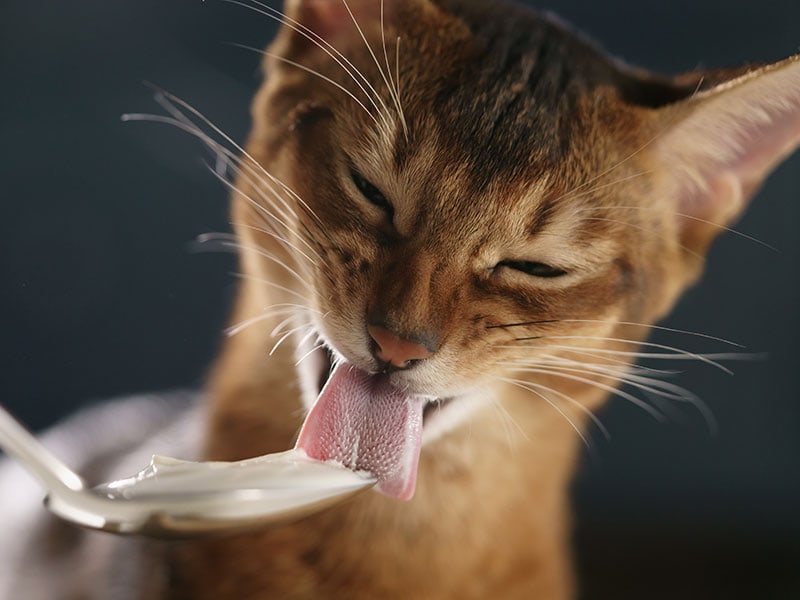Can Cats Eat Yogurt?
The question of whether cats can eat yogurt has raised many concerns for their owners. Sometimes, what all pet parents want to do is to share some quality time with their adorable cats – even food. Cats enjoy many kinds of human foods, from fish, meat to a bevy of fruits like melon, berries, and bananas.
Sadly, it’s not the same when it comes to yogurt. Although it’s true that some cats have a soft spot for yogurt, many others don’t, and usually, they react negatively. In this post, I will provide you with every answer to your worries about your cat’s safety regarding eating yogurt.
What are you waiting for? It’s time to let the cat out of the bag!
Is It Safe For Cats To Eat Yogurt?
In short, your cats can eat yogurt without falling ill, yet they should not eat it too much or too often. Before giving yogurt to cats, it’s important to read the nutrition labels or consult your vet. The best yogurt for cats is plain, unsweetened Greek yogurt.
Yogurt – A Healthy Dessert For Everyone, Even Cats
Yogurt is a delicious frozen dessert enjoyed by millions of people every year during the summer. Apart from the taste, yogurt is an excellent source of nutrients that benefit your health – what’s not to love? For those reasons, even your cats want to get their paws on this healthy treat.
What is yogurt made of? It is a dairy product fermented by yogurt cultures, namely Lactobacillus delbrueckii subsp. bulgaricus and Streptococcus thermophilus bacteria. These two cultures produce lactic acid, which lends a distinctive tartness to yogurt.
Yogurt is an excellent source of nutrients that benefits your health. It is rich in protein, which helps control your appetite and maintain your waistline. Yogurt is also packed with calcium, minerals, and vitamins B12. The probiotics added in yogurt bolster your immune system, reducing the risk of illnesses. A serving of yogurt per week is guaranteed to improve your health significantly.
Since yogurt is made for humans only, it might not be a good idea to give it to your felines on a regular basis. In case they lick some yogurt that you accidentally drop on the floor, don’t freak out. You will be surprised to know a smidgen of yogurt can be beneficial for your adorable pets.
Health Benefits Of Yogurt For Cats
How can a small amount of yogurt benefit your kitty’s health? Let’s break down the nutritional content of yogurt and the associated benefits.
Probiotics
As you have known, the two cultures found in yogurt are probiotics, which are the healthy bacteria that play a vital role in bolstering your cat’s immune system. The probiotics also help tackle numerous digestive problems, minimizing the risk of several illnesses such as inflammatory bowel disease (IBD).(1)
IBD is a condition that many cats have to go through in their lifetime, especially during the adolescent phase. This happens when your cat ingests something it shouldn’t have. A typical example is your cat’s hair, as cats spend 30-50% of the time grooming themselves every day.
Obviously, cats don’t brush their teeth, so why do they have such pearly whites? The answer is probiotics. These bacteria brighten cats’ teeth and, at the same time, support their gum health.
Other Nutrients
Besides cats’ regular diet, a spoonful of yogurt provides your pet friends with many nutrients. What can they get from a tiny serving of Greek yogurt?
Protein
Even though cats are smaller than dogs, you will be surprised to know that they rely more on proteins since cats are carnivores (animals that eat meat). (3) Like humans, protein plays an integral role in cats’ health. What do they do?
Proteins are the building blocks that help build the bones, muscles, blood, skin, and hair. Proteins are also responsible for forming amino acids, the organic compounds used to create new proteins and regulate bodily functions.
Magnesium
Magnesium is an essential mineral that supports cats’ heart and bone health. In addition, this element helps your furry pals release the tension. However, too much magnesium in a cat’s diet is not recommended, as it causes several symptoms such as weakness, paralysis, coma, or even death.
Calcium
Cats need calcium, just like their pet parents. Calcium has a crucial role in bolstering cats’ teeth, bones, and muscles.(4) Note that if fed to excess, calcium can weaken their bones in the long term.
Potassium
Potassium is another macronutrient that benefits your furry friends. It’s a mineral that helps cats prevent kidney problems. (5) At the same time, this K element strengthens their muscles and nerves.
Other Vitamins And Antibiotics
In a tiny teeny amount of Greek yogurt, your cat receives a sufficient amount of B2, B12, and C. Plus, there is a significant number of antibiotics that fight against harmful organisms in your cat’s body.
Why Cats Should Not Overeat Yogurt
First, keep in mind that your cats are lactose intolerant – in plain English, they are allergic to sugar. However, back in the day, when they were just tiny little kittens, they could still feed on cow’s milk (which has sugar, obviously) when they are separated from their mothers.
Inherently, kittens have amylase enzymes in their saliva. (2) These enzymes act as a catalyst to help digest sugar. After twelve weeks, more or less, these enzymes stop developing and eventually disappear. As a result, their interest in sweet food fades.
Even if your cats are willing to give yogurt a try, it doesn’t mean that they can digest it properly. Yogurt can cause several side effects that you cannot see from the outside, such as painful gas. Finally, although it’s rare, some cats are allergic to yogurt – even a dab can threaten their lives!
Symptoms That Your Cats Are Allergic To Yogurt
Even when other cats are okay with having some delicious yogurt, that doesn’t mean your cat has the same opinion. Some cats are very sensitive, and they tend to react negatively to yogurt. Here are some common symptoms that your cats will show to tell you that they hate yogurt with all their nine lives:
- Diarrhea
- Vomiting
- Abdominal pain
- Loss of appetite and weight
- Indigestion
- Sluggishness
- Skin infection
Immediately bring your cat to the nearest vet if it displays such symptoms. Don’t give them any pills or medicines without the vet’s consultation.
What Kinds Of Yogurt Can Your Cats Eat?
Since cats are lactose intolerant, the best kind of yogurt I suggest for your cats is the plain flavor, unsweetened Greek yogurt. This type of yogurt is suitable for cats because it contains two strains of culture that break down lactose into lactic acid, making yogurt easier to digest.
You will also need to check out the label to see if there’s any harmful ingredient. For instance, if it says “fructose, maltose, sucrose, corn sweetener,” it’s a big no for your cats – these all count as sugars. Xylitol is another artificial sweetener that cats must not eat under any circumstances. Same rule applies to food additives and emulsifiers.
What about yogurt with fruits in it? That depends on what type of fruit it is. Some of the cats’ favorite fruits are apples, bananas, blueberries, strawberries, and watermelon (with seeds removed, of course). These feline-friendly fruits are rich in vitamins and potassium.
Yogurt with nuts or raisins shouldn’t be given to cats. Fat and salt found in nuts are detrimental to their health, while raisins are the reason behind kidney failure.
Conclusively, yogurt is nothing but an occasional treat for your cats. Yogurt should not be a supplement food as well. If you want to make up for the lack of nutrients in your cat’s diet, vitamins and supplements are the better choices.
You can see this video to know more:
FAQs
Do you (and your cat) still have some questions after this article? Take a look at these relevant questions to clear up your confusion.
An Extra Tip For Your Little Furballs
Cats love to explore, and that eagerness extends to food, too. If your cat is not fond of yogurt (for the thick texture, the tartness, or whatever the reason is), you can serve it whole, skimmed, or lactose-free milk instead. Cat-Sip and Catsure are the two top-quality brands of cat milk for you to consider.
For safety reasons, let them slurp a bit to see how they react to it. One more reminder for you is that drinking too much milk can cause dehydration, so don’t let your cat drink in large quantities.
I hope that this post has eased your mind from the fact that your cat lapped up the remaining yogurt you left on the kitchen counter. If you want to give further advice on feeding cats yogurt, comment right down below so that other cat lovers and I can see. Your opinions are highly appreciated here.

